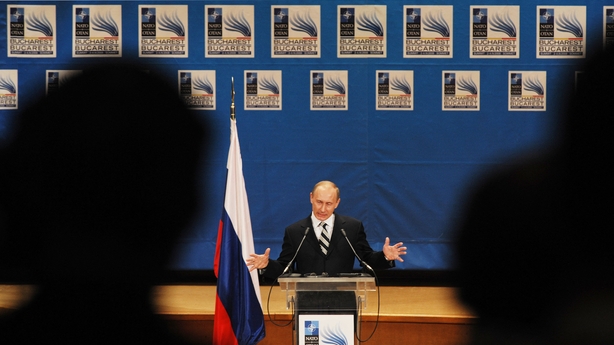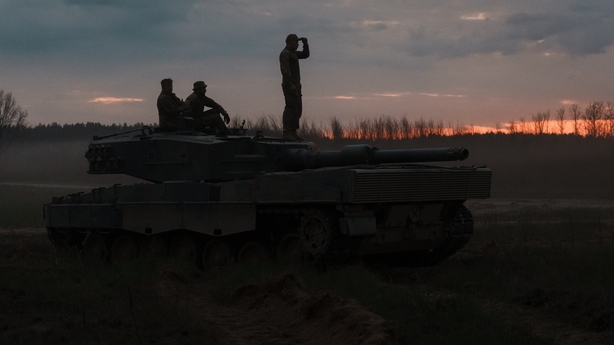Last week, Ukrainian President Volodymyr Zelensky sent a message to NATO leaders ahead of the alliance's summit in the Lithuanian capital, Vilnius.
"We are working with our partners as hard as we can to ensure that our common security in Vilnius prevails. It all depends on our partners," he said during his nighttime address to Ukrainians on 5 July.
Kyiv applied for membership of the military alliance last September.
Since then, it has received little clarity on where its application stands.
"I think all allies agree that Ukraine's place is really within the Euro-Atlantic community. So, in time, Ukraine should be in NATO. The question is over the path to get there," Sean Monaghan, a NATO and European defence policy analyst, told RTÉ News.
Last month, Mr Zelensky conceded that Ukraine will be unable join the alliance while still at war, a point first made by NATO secretary-general Jens Stoltenberg in April.
However, Mr Zelensky said that Ukraine wanted to receive a signal "that, after the war, Ukraine will be a member of NATO".
Will that signal be forthcoming in Vilnius?
Thus far, it seems unlikely.
"The fact is, there is still no consensus on whether Ukraine should be a member at all," Wojciech Lorenz, a senior Polish defence analyst, told RTÉ News.
We need your consent to load this Datawrapper contentWe use Datawrapper to manage extra content that can set cookies on your device and collect data about your activity. Please review their details and accept them to load the content.Manage Preferences
Poland, Lithuania, Latvia and Estonia are the most ardent supporters of Ukraine’s application, and want a firm commitment on a timeline for Kyiv to join.
But they represent a minority viewpoint within the alliance, and it is unlikely that any formal process for integration will be offered to Ukraine at the summit.
The biggest problem facing Ukraine's bid, Mr Lorenz said, was the lack of consensus in the Biden administration over offering Ukraine membership.
The US has been the largest funder of military support to Ukraine. According to the Kiel Institute's Ukraine Support Tracker, it has provided more than €42 billion since the start of the war. But it does not wish to raise the stakes with Russia and push the alliance towards a full-scale war.
"If there is no consensus in the administration itself, you cannot even start a discussion that should lead to bipartisan consensus between Democrats and Republicans in the United States, or whether the US is really ready to support Ukraine's membership in NATO," said Mr Lorenz, head of the international security program at the Polish Institute of International Affairs.
Like the US, Germany – the second-biggest spender on military aid to Ukraine – remains cautious on the Ukrainian bid.
Germany will not commit to agreeing to Ukraine's bid without the US doing so first.
Conversely, Washington is unlikely to act without Berlin because the Biden administration sees Germany as its major ally in Europe.
"This will be a catch-22 situation, created on purpose just to avoid a politically difficult decision," Mr Lorenz said.

The caution displayed by the US and Germany stems largely from a previous commitment that NATO made in 2008.
At that year's summit in Bucharest, alliance members agreed to allow Ukraine and Georgia to join NATO at some point in the future. However, no concrete plan was put in place to specify how and when they could join.
Four months after the Bucharest declaration, Russia invaded Georgia, sparking a five-day war. Russian troops still occupy two of the country's regions, South Ossetia and Abkhazia.
This was followed by Moscow's annexation of Crimea in 2014, and its full-scale invasion of Ukraine last year.
"The US and others are nervous about making commitments without backing it up with practical actions," said Mr Monaghan, a visiting fellow at CSIS, a national security think tank in Washington DC.
A third set of countries, Mr Monaghan said, which includes the UK, France and northern European members, want to "reaffirm the Bucharest language, and add some kind of more practical steps".
The UK favours dropping NATO's Membership Action Plan (MAP) in the case of Ukraine's bid.
Established in 1999, the action plan is a set of political, economic and military criteria that applicant countries must meet in order to join the alliance.
"We might see NATO allies agree to rescind the MAP requirements for Ukraine, as they did with Finland, and Sweden. So continuing the trajectory, but not full membership yet," said Mr Monaghan.
"I don't think we're going to see any dates."
French officials, too, previously reluctant to consider Ukraine's candidacy, are now, more favourable.
Outside of the NATO framework, it is also unlikely that the US and other members would offer Ukraine some form of bilateral security guarantee.
Mr Monaghan said that they were more likely "to commit to supporting Ukraine in the long term", and that Kyiv will look for solid commitments on the kind of financial support and defence systems they will receive.
Ukraine was stung before by a security guarantee, which it signed in Budapest in 1994.
Back then, the US, the UK and Russia agreed not to attack Ukraine in exchange for it to give up its nuclear arsenal.
Russia, of course, did not keep the terms of the 1994 agreement.

So, short of a guarantee on when it can expect to join NATO, or any bilateral security guarantees, what can Kyiv expect to take away from the summit in Vilnius?
"I think the important thing in Vilnius for NATO and Ukraine will actually be agreements outside of NATO's framework," said Mr Monaghan.
Many of the countries of the so-called Ramstein Group – NATO members and 23 other countries that have supplied military equipment to Ukraine – are likely to make further hardware commitments to Ukraine in Vilnius, albeit outside of the margins of the NATO summit.
Speaking in Vilnius on Friday, ahead of the summit, Mr Stoltenberg was already taming Ukrainian expectations.
Beyond the usual promise of supporting Ukraine for "as long as it takes", the NATO chief also said that alliance members "are stepping up and providing donations, military support, in an unprecedented way".
Ukraine is likely to leave the summit with more commitments from individual NATO members on military aid for its war effort, rather than a timeline on membership.
Sweden's experience shows that there is no such thing as a fast-track entry into the alliance.
Its application to join has been held up for more than six months by Turkey and Hungary, each for its own domestic political motives.
It is feasible that Ukraine would have to wait longer, given that Hungary's nationalist government continues to talk to Kremlin officials, and the friction between Budapest and Kyiv over the rights of the Hungarian minority in western Ukraine.
But that possibility is unlikely to dampen Ukraine's enthusiasm for membership.
"Everything short of NATO membership will just be postponing the decision, that inevitably, will have to be taken in a couple of years time," said Mr Lorenz.







